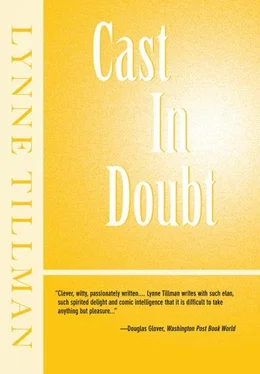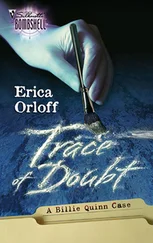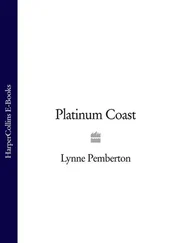I might visit John. I just might. Later, that came into my mind — rather than having to ask Helen anything. She might not like my doing it, but I’m free, as is she. I could pay him a call in the hospital — do a good deed, be a good Samaritan. Tell him Alicia said he needed company. She didn’t say he didn’t. Alicia never mentioned the idea of his needing company at all. John could be entirely harmless, a blessed event, or a malevolent soul, and it would be perfectly within reason for me to want to see if what Alicia thinks of him is true or has any relation to reality. Even a trace. Since Helen is my good friend.
The water dashes against the harbor, excited by something stirring beneath it. A beast, a hideous octopus is moving down below, a war is being waged between monsters of the deep, that kind of thing. I have been working steadily for some hours. Helen is not on her terrace.
The restaurant beckons, and I take my usual table. The wine is cold and tingles in my gullet and on my tongue. Alicia is not here again, which is good, as I might feel compelled to reveal something I oughtn’t, but that awful Wallace is. Is he out of jail so soon: Do I have to talk with him? He’s not really one of our crowd, such as it is, but an interloper on the scene, a madman, different from Stephen, whom I haven’t seen in months. Perhaps Wallace will tell me again his idea for irrigating the Sahara — planting a gigantic rubber tube in a fertile source, from which it will suck water, carry it miles and miles, then expel it into the parched desert. He talks about his invention with such unwarranted excitement he means it to be taken seriously.
Wallace plops down at my table, uninvited, pulling along his Dutch girlfriend, who understands his Afrikaans. I ought to feel pity for Wallace, in and out of mental asylums and jails, this last time for indecent exposure, which could have gotten him thrown out of the country, but someone — probably Roger, he plays chess with one of the judges — interceded. Wallace’s parents own one of the major newspapers in South Africa, and all of this must have been trotted out — Wallace’s respected books of poetry along with his mother and father, whom Wallace despises for their politics and so on. On the basis of this, no doubt, he was set free. And here he is. I wish I’d been on the beach last week when he ran into the water wearing a red net bikini bathing suit. Not the thing to do here, even if men expose themselves, and certainly touch themselves, regularly. They do it furtively — but not Wallace, he’s a flaunter. I ought to have sympathy for him — committed to a mental institution when he was just a boy of sixteen, deemed insane for opposing apartheid. He was sane then but has over the years lost whatever marbles he had, I think, though occasionally he’s lucid and amusing. I find it hard to tolerate him. He talks so much, in that annoying accent.
I cut my fish, lifting the flesh away from the bone. My hand is steady and as usual I wonder if I oughtn’t to have become a surgeon, since I enjoy doing this so much. I always think this when I cut flesh, exactly the same thought, and always wonder, in precisely the same way, if others have the same thought when they do simple tasks over and again, and then what would it be like, if that were so, to be working in a factory, on the line, doing the same job daily, repetitively? I do a good job with my fish and feel satisfied. Little things please me. My mother could never serve fish that was not riven with bones. I hated fish, the way most children do, and it took me years to develop a taste for it, and if I hadn’t I couldn’t have made my home in Greece.
At the moment I seem to be invisible at my own table, which is to my liking. Wallace and his friend chatter away in Afrikaans. I’m sure his Dutch girlfriend is kind but I have an antipathy to the Dutch and may be the only non-Belgian or non-German so inclined, or disinclined. Years ago I visited Amsterdam and had a most dreadful time. I stayed a few months, it rained constantly, and I met no one and found the Dutch barely civil. Everyone says they’re so nice, so I never interject that I think they are dull. Actually I don’t know if they are, but I nurse my secret dislike, my prejudice, and allow it to develop unhindered by scrutiny. The Dutch, I want to tell Wallace, have given tolerance a bad name.
I don’t know how Wallace held up in court, if he did, or whether he had to face the judge at all. What does his girlfriend find appealing about him? This is a man who is never at a loss for the ladies, to be euphemistic about it. He’s had more lovers than one would ever guess from looking at him; only a distorted notion of sexual freedom could have allowed this outrage, this flourishing of a lunatic Don Juan. Wallace professes to adore the female sex and has set many poems in bedrooms where his beloved lies déshabillée on a bed, which allows him to describe in fanatic detail the beauty of the female body, the pearl he nuzzles with his nose and licks with his tongue, that sort of thing. Of course the French have a word for poems celebrating the woman’s body— blasons . But what do women see in him? Perhaps when he was young he had a certain je ne sais quoi ….
But now? He has a paunch and is disheveled. He has the worst set of caps I’ve ever seen. He whistles through them when he speaks. His eyes protrude like mine. And he tends to leer when he looks, projecting a mad intensity; I suppose someone else might say it signaled genius but to me it is most hilarious, signifying nothing like intelligence. His girlfriend’s not laughing. Oh dear, Wallace is reading his poetry aloud, in English, something about a dog. I’m barely listening. Where the hell is Roger? Roger might relieve me of the burden of seeming to listen to Wallace. I know Roger plans to relieve Wallace of some of his money, to pluck it from him for some scheme or other, to buy property here through a Greek lawyer, to open a café. Roger always has something on the boil; he’s one of those kinds of people who keep things moving by concocting ideas — for money, usually — which other people ought to invest in or become involved with. A magazine he’d edit or a property he’d administer. Sometimes they do give him money, but I never have. It’s a point of pride with me.
Wallace has stopped reciting his poem. Now he’s defending Pound to the Dutchwoman. She must be completely uninterested. He’s whistling on about T.S. Eliot, being fierce as usual about Pound, about whom he’s ambivalent. Whatever sympathy he has for Pound was aroused because he — Wallace — and Pound are both considered traitors by some of their countrymen. I think Pound’s support of Fascism was a type of temporary psychosis, to which Wallace is no stranger either, I might add. Wallace is more paranoid than I could ever be; and he is rabidly heterosexual. Though, again, I can’t see why any woman would want to sleep with him.
I’ve often noticed that even the most unpleasant men attract reasonable and kind women; these women put up with and serve these men for ages. They cook and clean for them, tidy up their social messes. And what for? The love of genius. It’s not likely that genius could be attached to so many miscreants. Sometimes the women are masochistic, but then so am I, I should think, in some ways, and I’d never want a man like Wallace. He’s unbearable.
He seems to think he saw Pound in St. Elizabeth’s, insisting that he did visit him and even hid behind a tree to watch him after he was supposed to have left the hospital grounds. I hope Wallace was sane when he did so, although it doesn’t sound as if he was. Imagine how Pound must have felt being incarcerated in a mental hospital, locked up with and surrounded by manic depressives and schizophrenics, and then to have an ambulatory lunatic like Wallace pop up, scot-free, raving as wildly as any in there with him! I don’t believe Pound was truly insane. He was an arrogant and disagreeable man but an important poet, nonetheless. In this I agree with Wallace. T.S. Eliot was playing possum, Wallace now declares. Wallace has dropped to the ground to imitate a possum, and his girlfriend is urging him to stand up or sit down. This is tiresome.
Читать дальше












